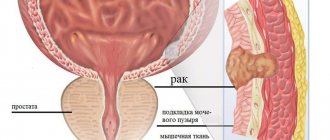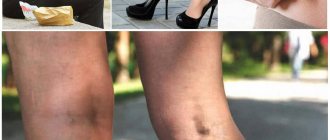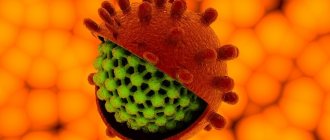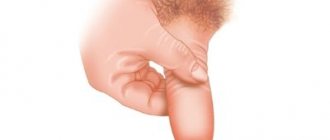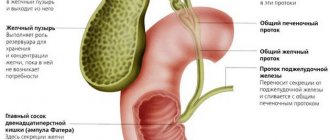Free consultation on treatment in Moscow. Call or fill out the form below:
Vulvar cancer is a malignant tumor that occurs on the skin and mucous membranes of the external genitalia. More than 4,000 patients with vulvar cancer are diagnosed every year. Death within a year, despite the assistance provided, occurs in every fifth person. The high mortality rate is due to the fact that patients do not turn to specialists for a long time. The consequences of such an attitude towards one’s health are disappointing - indifference leads to the fact that initially operable vulvar cancer becomes incurable.
The incidence in Russia is approximately 2–5%. Epidemiology shows that its prevalence in developing countries (Peru, Brazil) is higher than throughout the world, and in Asian women the incidence rate does not exceed 1.5%.
At risk are older people over 65 years of age, since at this age the female hormonal background undergoes significant changes. Vulvar cancer rarely develops in adolescents and fertile women. Considering the age of the patients, it can be assumed that malignancy occurs against the background of dystrophic degeneration caused by aging. For various reasons, older people are less likely to visit a gynecologist, which leads to neglect of the pathology.
Vulvar cancer is not contagious to others. It is impossible to become infected through breathing or airborne droplets, but there are some infectious diseases that contribute to its formation, for example, human papillomavirus (HPV), AIDS.
If you or your loved ones need medical assistance, contact us. The site’s specialists will recommend a clinic where you can get effective treatment:
Types of Vulvar Cancer
There are types of vulvar cancer, which are based on its histological structure, direction of growth and other features.
The cytological picture makes it possible to distinguish the following types:
- • squamous;
- • basal cell;
- • melanoma;
- • Paget's disease;
- • adenocarcinoma;
- • Bartholin gland carcinoma.
Squamous cell carcinoma accounts for 80–90% of cases; other types are much less common.
Based on the direction of germination, exophytic and endophytic forms are distinguished.
The international TNM classification shows the prevalence of the process and takes into account:
- • sizes of the primary tumor (T0, T1, T2, T3, T4);
- • damage to lymph nodes (N0, N1, N2);
- • presence of metastases (M0, M1).
What is a vulva?
The vulva is the collection of external female genitalia. These include the paired labia majora and minora, the vestibule of the vagina they form with the Bartholin glands, the hymen, the clitoris, and the pubis. The vulva is involved in the formation of a woman’s sexual feeling (desire and arousal), its physiological changes provide comfort during sexual intercourse. The external genitalia are also the final part of the birth canal.
The vulva also performs a protective function. An intact hymen before the onset of sexual activity is a natural barrier at the mouth of the vagina, the labia absorb shock and serve as an obstacle to foreign bodies, and the secretion secreted by the Bartholin glands provides moisture to the mucous membrane of the vulva and the lower third of the vagina, facilitating the sliding of the penis during intercourse.
Vulvar cancer symptoms and signs with photos
In the early stages of vulvar cancer, the patient may have no obvious complaints. Sometimes its harbingers are leukoplakia, kraurosis, and lichen sclerosus. Often the onset of the disease is asymptomatic.
The most initial signs of vulvar cancer are a feeling of itching, discomfort or burning in the genital tract. Pain syndrome usually appears later. It is difficult to detect the first external changes without examination, but sometimes you can notice that a lump (enlarged lymph node) has appeared in the groin area, which does not hurt.
The primary visible manifestations are spots on the mucous membrane, the detection of which is not difficult: it is enough to carefully examine the vulva, but this is often done too late. The spots have a whitish-grayish tint; similar symptoms occur with leukoplakia.
Characteristic symptoms of exophytic growth are inflammation, ulceration, purulent, bloody discharge, which indicate that the disintegration of the cancerous tumor has begun. Endophytic germination is characterized by swelling, compaction, and infiltration.
Late manifestations include weakness, fatigue, and low fever. In the terminal stage, symptoms progress rapidly, which is expressed by severe exhaustion, weight loss, weak pulse, shortness of breath with light exertion. As a result, death occurs.
Causes of the pathological condition
The sensation of itching in the genital area can be due to a huge number of reasons, which are divided into several groups:
Infectious diseases of the genital area
This includes diseases that can be contracted through sexual intercourse, and pathologies that arise as a result of disturbances in the vaginal microflora as a result of other reasons. Infectious causes can also be called parasites entering the mucous membrane from the rectum or the skin of the perineum.
The main diseases transmitted from an infected sexual partner that can cause vulvar itching are:
- trichomoniasis;
- chlamydia;
- genital herpes;
- ureaplasmosis;
- mycoplasmosis;
- candidiasis;
- inflammation of the genital organs caused by the papillomatosis virus;
- gardnerellosis;
- syphilis;
- gonococcosis.
When infection of the internal reproductive organs does not occur as a result of contact with an infected partner, it can be caused by various microorganisms: staphylococci, Escherichia coli, streptococci, Pseudomonas aeruginosa.
They occur as a result of hypothermia; after an abortion, surgery or curettage; with tattooing or piercing performed under non-sterile conditions; as a complication of bartholinitis or urethritis; after treatment with antibacterial drugs. After taking antibiotics, vulvar itching is most often caused by Candida fungus.
Parasitic and some other diseases
Parasitic diseases that cause itching in the vulva area are: pinworms, scabies, pubic and body lice.
Favorable conditions for the development of an infectious-inflammatory process are created with diabetes (one of the early manifestations of the disease is thrush), HIV infection, and also during menopause.
Non-communicable diseases
Itching of the vulvar area may occur as a result of:
- plasma cell vulvitis;
- atrophic vulvitis;
- squamous intraepithelial neoplasia of the vulva - a precancerous disease caused by papillomavirus type 16;
- cancer of one of the genital structures;
- polyps, fibroids or uterine fibroids;
- Gartner's canal cysts.
Mechanical irritations
Frequent causes of itching of the vulvar area may be due to rubbing underwear or tight trousers; vigorously wiping the genitals with toilet paper; underwear that has soap or washing powder residue on it; frequent washing with detergents (soap, shower gels), which wash away their protective top layer from the mucous membranes, which leads to drying of the mucous membranes.
Skin diseases
A woman may experience itching in the genital area due to:
- lichen sclerosus;
- lichen planus;
- genital psoriasis;
- pityriasis rosea;
- lichen sclerosus of the vulva;
- eczema: contact, atopic.
Pathologies of internal organs and blood
Diseases of some internal organs cause both skin itching and vulvar itching. The following pathologies can do this:
- dysfunction of the thyroid gland;
- liver diseases (hepatitis, cirrhosis);
- late stages of chronic renal failure;
- diabetes;
- low blood iron levels;
- hypervitaminosis D;
- malignant pathologies of the hematopoietic organs: lymphogranulomatosis, leukemia;
- gout;
- some autoimmune diseases (for example, Sjögren's disease).
Mental factors
When a woman lives under stress or is very nervous, her genitals may begin to itch.
Allergic causes
In most cases, an allergic reaction is observed to intimate care products and laundry products, sperm from a sexual partner, gel lubricants and latex condoms, as well as fabric dyes.
Chemical and physical irritants
As a result of hypothermia or constant contamination of the vulvar area with urine or feces (which is observed with incontinence or urogenital fistulas), a woman may suffer from periodic or constant itching.
When the reasons are an imbalance of female sex hormones
In addition to thyroid hormones and insulin, the condition of the genital organs is influenced by female hormones, of which there are several types. During life, their ratio changes, which provokes itching of the vulva.
When does the vulvar area start to itch before menstruation?
Itching of the vulva before menstruation can begin a week or 1-2 days before it. In different women, its intensity varies from mild to unbearable. The cause of this condition is a combination of decreased immunity of the vulva and vagina, alkalization of vaginal pH due to changes in the ratio of estrogen and progesterone, against which:
- or fungal (mainly thrush), bacterial (especially gardnerellosis) or viral infections of the genital tract appear;
- or hypersensitivity of the vulva to mechanical irritants develops;
- or hygiene rules are violated - from insufficient to excessive washing of the genitals.
If your genitals are itchy during pregnancy
A symptom that occurs at this time may indicate a physiological phenomenon - an increase in blood supply and slight swelling of the genitals, which causes itching. On the other hand, decreased immunity and changes in the level of vaginal-vulvar pH make it easier for infection to penetrate here. The most common infections that occur during pregnancy are thrush and genital herpes.
Itching while breastfeeding
After childbirth, estrogen decreases, and this causes dryness of the vulva and vagina, which causes discomfort.
After menopause
Itching of the vulva in old age is a very common phenomenon. It is caused by a decrease in estrogen levels, as a result of which the mucous membrane of the vulva atrophies, and connective tissue develops here. Itching during kraurosis can be unbearable and debilitating. It needs to be treated, and it can be treated, otherwise the scratching wounds get infected, which leads to an increase in the symptom and can cause complications in the internal reproductive organs.
In some cases, the cause of the symptom cannot be determined.
Causes of vulvar cancer
The etiology and main causes of vulvar cancer are not fully understood, but in 50% of patients, papillomatosis is found on the body, the causative agent is papillomavirus. It is transmitted through household contact, and there are strains that cause the formation of condylomas and warts, which are highly oncogenic. Often the disease begins with the appearance of papillomatous growths. Penetrating the epithelium, the papillomavirus changes the DNA structure, which causes dysplasia and accelerated division. The urgency of the problem is that if vulvar cancer is detected in a girl or young woman, then with an 80% probability HPV is also detected, and more than 90% of the world's population is infected with it.
Vulvar cancer is often inherited from mother to daughter. Hereditary predisposition is noted in 30% of cases. This is the so-called intraepithelial neoplasia. The gene that causes it has not yet been identified.
Psychosomatics explains that a malignant tumor is formed as a result of mental experiences, often unconscious, lack of attention and love. According to teaching, hatred, resentment, malice and envy towards another person can cause cancer.
Symptoms
When the vulva is irritated, different symptoms can develop, depending on the underlying cause of the irritation. In some cases, symptoms appear exclusively in the genital area, but sometimes people experience problems in other parts of the body.
Irritations and allergies
If irritation in the vulva area is caused by allergens or irritants, the woman may experience a tingling or burning sensation.
When the body is exposed to irritants, people usually begin to experience symptoms soon after exposure. Irritants may include various chemicals, such as soaps, perfumes, or lubricants. But with allergies, symptoms can appear several days after the body is exposed to allergens. Such reactions can occur, for example, after washing clothes with certain washing powders.
Stages of vulvar cancer
For the treatment of vulvar cancer, the degree of spread of the tumor is important.:
- • 0 or in situ – characterized by damage to the epithelium only;
- • 1 (first) - tumor size is no more than 2 cm, does not extend beyond the vulva;
- • 2 (second) - tumor size more than 2 cm;
- • 3 (third) - the tumor grows into neighboring tissues (vagina, urethra, anus), unilateral damage to the lymph nodes is observed;
- • 4 (fourth) - the tumor grows into other organs and bones, there are lymph nodes affected by metastases on both sides.
At an early stage, with timely treatment, survival rate reaches 98%. The neoplasm can spread throughout the body within 3–4 months; distant metastases are often found in the lungs. The last stage is practically untreatable; the efforts of doctors are aimed only at helping to alleviate the condition of the sick person.
Diagnosis of vulvar cancer
By collecting an anamnesis (medical history) and interviewing, the dynamics of the pathological process, the course, and the benign nature of the formation are determined. If vulvar cancer is suspected, examinations carried out to clarify the diagnosis include :
- • gynecological examination, which shows external changes;
- • palpation or identification of enlarged inguinal and femoral lymph nodes;
- • colposcopy to determine germination;
- • Vulvoscopy - check modified cells for dysplasia;
- • smear cytology, PAP test or checking for the presence of cancer cells and a description of their structure;
- • biopsy and histological examination;
- • Ultrasound of the pelvis and lymph nodes, which makes it possible to identify metastases.
When vulvar cancer metastasizes to other areas, diagnosis is:
- • finger-rectal examination;
- • x-rays of the lungs;
- • urethroscopy;
- • PET-CT or MRI (photographs can detect distant metastases).
The conclusion and prognosis of the disease depend on the combination of symptoms and clinical research data. It is necessary to take into account the duration of the course and the state of health.
Treatment and care at home
The choice of treatment methods will depend on the underlying cause of the discomfort. For example, for dermatitis, therapy may involve identifying the irritant, after which the patient simply needs to avoid contact with it.
If a woman is concerned about an STI, the doctor may prescribe medications to eliminate the infection. While some STIs can be completely eliminated, others require women to manage in the long term.
If a yeast infection is causing the irritation, over-the-counter antifungal creams can help. And when such remedies don't help, doctors usually prescribe stronger prescription drugs.
Doctors treat bacterial infections, including UTIs, with antibiotics.
Therapeutic strategies used for rashes, skin conditions and irritations associated with hormonal changes include the following:
- use of humidifiers;
- taking over-the-counter antihistamines;
- using anti-itch creams or ointments;
- taking oatmeal baths;
- applying cold compresses to relieve pain;
- use of lubricants if irritation occurs during sex.
In some cases, women are able to prevent the development of irritation in the vulvar area. For example, to prevent folliculitis when shaving in the intimate area, you should use sharp razors or not shave the hair at all, but only carefully trim it with scissors.
Vulvar cancer treatment
Vulvar cancer is dangerous but curable. If left untreated, the disease is fatal, and death can occur within a year. There is a chance to survive and stop the development of carcinoma if a person does not start the disease and consults a doctor to receive appropriate medical care. You should not try to get rid of it yourself, take painkillers, or look for an effective remedy in the recipes that traditional medicine offers against cancer.
Developments in gynecology, surgery, and oncology help cure and defeat the disease. Management tactics consist of combination treatment, which slows down the rate of cancer development, allows you to recover or prolong life.
It includes:
- • surgical removal of the focus and metastases;
- • chemotherapy with cytostatics;
- • radiation therapy;
- • pain relief.
Recovery occurs after surgery, in which the vulva and regional lymph nodes are removed. Sometimes this is only clinical remission, but its duration varies. Relapses after surgery occur in 4–8% of cases. The timing of their occurrence cannot be predicted; sometimes it is necessary to operate again.
Advanced, inoperable cancer (or if there are contraindications to surgery) still requires palliative treatment. Radiation and chemotherapy are usually prescribed, and the actions taken by the oncologist are aimed at alleviating suffering.
Treatment of chronic vulvitis
Treatment is prescribed after confirming the diagnosis and establishing the type of vulvitis. Therapy requires an integrated approach, which includes the use of fungicidal drugs, antibiotics, antiseptic solutions, ointments, and suppositories.
The methods used are aimed at sanitizing the vagina, treating inflammatory processes of the reproductive organs, as well as increasing immunity.
The most commonly used drugs are:
Suppositories: Terzhinan, Polygynax, Ginalgin, Hexicon with chlorhexidine. In chronic cases, they are used once a day; subacute vulvitis (up to 3 months) requires an increase in the norm to 2 suppositories per day.- Antiseptic ointments and solutions: Lactagel, Triderm, Levomekol, Syntomycin ointment, baths with a weak solution of manganese or chamomile infusion.
- Antibiotics: Amoxiclav, Doxycycline, Erythromycin.
- For a long-term course, immunomodulating therapy, taking multivitamins, and biogenic stimulants are recommended.
- Allergic manifestations are eliminated with antihistamines.
In case of chronic vulvitis, physiological procedures are also indicated:
- Electrophoresis using medicinal solutions on the pubic area and inner thighs. The procedure allows you to relieve swelling and pain.
- Ural Federal District. Accelerates the process of regeneration of damaged tissues, normalizes metabolic processes at the cellular level.
- Local laser phoresis. Eliminates the inflammatory process, improves blood circulation, prevents cellular oxygen starvation.
In parallel with drug treatment, folk recipes are used to eliminate vulvitis. The most commonly used are infusions and decoctions of medicinal herbs and plants. The most popular are: chamomile, string, nettle, oak bark, marigold flowers.
Preventing vulvar cancer
How to prevent and fight vulvar cancer? Prevention of cancer pathologies helps to avoid exposure to factors harmful to the body and protects against them. To prevent the occurrence of vulvar cancer, it is recommended to eliminate or reduce exposure to hazardous factors, and treat concomitant diseases in a timely manner.
Harmful:
- • smoking, alcohol;
- • STDs;
- • excess weight (obesity);
- • disturbance of hormone levels (diabetes mellitus);
- • carcinogens (chemicals, radiation);
- • vascular problems that cause disruption of tissue nutrition (hypertension, atherosclerosis).
Tips to help prevent vulvar cancer:
- • good sleep;
- • daily regime;
- • healthy lifestyle;
- • proper nutrition;
- • preventive examinations.
It is easier and more effective to treat the disease at the initial stage, therefore, after 50 years, every woman should visit a gynecologist annually.
How and with what to treat vulvitis: principles of therapy
If signs of inflammation of the external genitalia appear, it is necessary to consult a doctor as soon as possible for an examination, since vulvitis can only be treated by addressing the underlying cause of the disease. Neglect of this rule is fraught not only with the development of various complications, but also with infection of sexual partners and even family members.
Basic treatment of vulvitis is carried out by a gynecologist; if necessary, doctors of other specialties are involved: dermatovenerologists, urologists, proctologists. The complex of measures taken has a symptomatic, etiotropic, pathogenetic, regenerative and immunostimulating effect. In addition to medicines, traditional medicine and physiotherapy are widely used.
The selection of a treatment regimen is carried out individually, taking into account the cause and form of the disease, the severity of the inflammatory process, the age and general condition of the patient. In this case, general and systemic therapy are combined, which makes it possible to influence different parts of the pathogenesis. Chronic and subacute vulvitis require the prescription of drugs with an immunostimulating effect, sanitation of foci of infection, vitamin supplementation of the patient and correction of her diet.
During the period of treatment, it is recommended to abstain from sexual intercourse and avoid visiting swimming pools, baths and saunas. In children with severe vulvitis with signs of general intoxication, temporary semi-bed rest may be required.
If the specific nature of vulvitis is confirmed, treatment is carried out by a gynecologist and dermatovenerologist, and all sexual partners of the woman are subject to examination. Until negative results of control tests are obtained, the patient is prohibited from any form of intimate relations. If an STD is detected in a girl, testing is prescribed not only for the mother, but also for all adult family members. Specific vulvitis in adolescent patients is the basis for carrying out health education work highlighting the issue of using barrier means for contraception and protection against infection.
When treating young children, hygiene training must be provided to the mother or other person providing daily care. In the case of recurrent vulvitis in girls of preschool age, a thorough survey of parents is carried out to identify the child’s tendency to masturbate. If necessary, a consultation with a neurologist, psychologist, or child psychiatrist is scheduled.
Treatment of vulvitis in children has its own characteristics. Preference is given to local therapy, and antibiotics are prescribed only for severe and resistant forms of the disease. The child must be examined three times for helminth infections to rule out an allergic cause of vulvitis. When synechia appears, careful surgical separation of the labia minora is performed on an outpatient basis.
Treatment of any form of vulvitis is carried out even after the patient’s condition improves. Premature refusal of drugs and non-compliance with the recommended treatment regimen are the main reasons for the development of resistance of pathogens to antibacterial drugs and the transition of the inflammatory process to the chronic stage.
A dubious prognosis is also expected when treating vulvitis only with folk remedies. After all, chamomile and other medicinal plants have a predominantly anti-inflammatory effect; in most cases, they are not able to completely destroy the pathogen. And homemade ointment for vulvitis can provoke an allergic reaction and aggravate inflammation.
Competent! Elimination of the causative factor is the basis of treatment of vulvitis.
Carrying out local symptomatic and anti-inflammatory therapy
Etiotropic treatment for vulvitis may include:
- Antibacterial drugs to suppress coccal flora.
- Special antimicrobial regimens for trichomoniasis, gonorrhea, syphilis and other STDs.
- Antifungal (antimycotic) agents if fungal vulvitis is diagnosed.
- Antiviral drugs for genital herpes.
- Medicines with anthelmintic action, if vulvitis is caused by confirmed helminthic infestation.
- Estrogen replacement therapy, which allows to influence primary atrophic colpitis of the menopausal period.
- Surgical techniques for closing existing fistulas.
In addition, etiotropic treatment may include identifying and eliminating the effect of the allergen. This could be a change in the brand of diapers used, hygiene, care and detergent products, or nutritional correction.
In some cases, such measures make it possible to eliminate allergic vulvitis in girls in the first year of life without the use of potent drugs. It is important to understand that the use of antihistamines in this case is not a measure of etiotropic nature, although it makes it possible to influence the key link in the pathogenesis.
Antibiotics for vulvitis can be prescribed as local or systemic therapy, taking into account the etiology of the disease and the sensitivity of the pathogens. In adult patients, mainly modern combination drugs are used, which sometimes include an antifungal component. These can be suppositories, vaginal tablets and capsules, creams.
In children, preference is given to monocomponent drugs. Oletterin and Erythromycin ointments are usually used as the main treatment for vulvitis in girls of infant and preschool age.
Local antiseptics can also be used as prescribed by a doctor: Chlorhexidine, Miramistin, Furacillin, Chlorphyllipt, Sangiviritin, Levomekol. For girls over 8 years of age, Tetracycline ointment may be prescribed.
